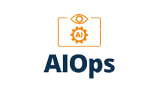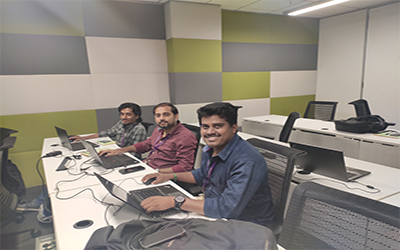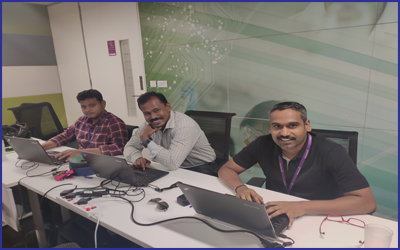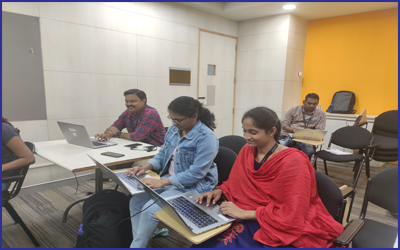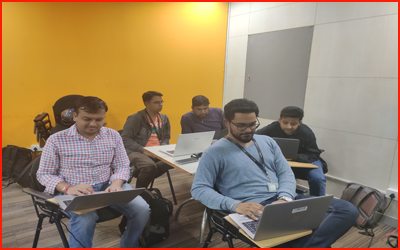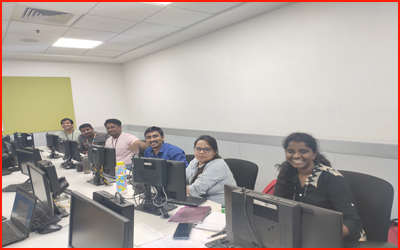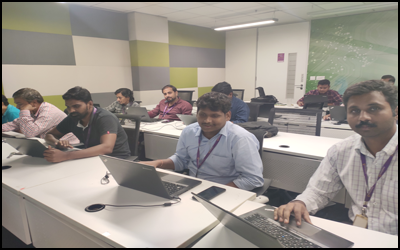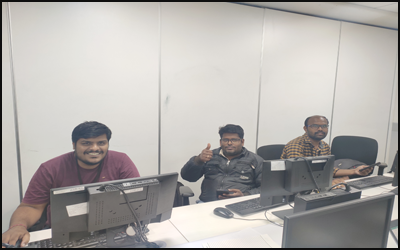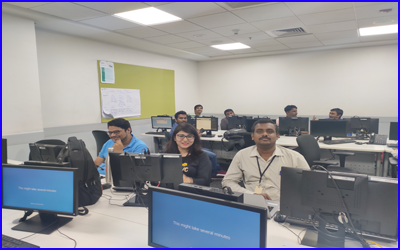AGENDA OF THE AIOPS CERTIFICATION TRAINING Download Curriculum
-
Introduction to AIOps:
-
What is AIOps?
-
Benefits of AIOps for IT operations.
-
How AIOps helps in monitoring and managing IT environments.
-
Role of Artificial Intelligence and Machine Learning in automating IT operations.
-
Key use cases of AIOps.
-
-
Components of AIOps:
-
Event Management
-
Incident Management
-
Automation and Self-Healing
-
Root Cause Analysis (RCA)
-
Predictive Analytics
-
-
AIOps in the Modern IT Ecosystem:
-
Integration with existing IT operations.
-
AIOps platforms overview (Moogsoft, BigPanda, etc.)
-
-
Real-world Case Studies of AIOps:
-
How businesses have successfully implemented AIOps.
-
Key challenges and best practices.
-
-
Introduction to Bash Scripting:
-
Understanding the Linux terminal and basic commands.
-
Basics of shell scripting.
-
-
Key Concepts in Bash Scripting:
-
Variables, strings, and data types in Bash.
-
Control flow in Bash: If-else, loops, and case statements.
-
Functions in Bash.
-
Handling user inputs and outputs.
-
-
File Operations:
-
Creating, deleting, and modifying files with Bash.
-
Reading and writing to files in Bash.
-
-
Automating System Tasks with Bash Scripts:
-
Scheduled tasks using cron jobs.
-
Backup automation, log file rotation.
-
-
Debugging and Testing Bash Scripts:
-
Error handling in Bash.
-
Best practices in writing clean and efficient Bash scripts.
-
-
Overview of AWS:
-
Introduction to AWS cloud services.
-
Benefits of AWS cloud computing.
-
-
Core AWS Services:
-
EC2 (Elastic Compute Cloud)
-
S3 (Simple Storage Service)
-
IAM (Identity and Access Management)
-
VPC (Virtual Private Cloud)
-
Lambda (Serverless computing)
-
-
Architecting Solutions on AWS:
-
Best practices for architecture on AWS.
-
Multi-region and high-availability strategies.
-
Using AWS Well-Architected Framework.
-
-
Security in AWS:
-
Identity and Access Management (IAM)
-
Security Best Practices
-
Compliance in AWS
-
-
Monitoring and Optimization in AWS:
-
CloudWatch, CloudTrail, and Cost Explorer.
-
Autoscaling and load balancing in AWS.
-
-
Introduction to Docker:
-
What is Docker and why is it important?
-
Benefits of containers over traditional virtual machines.
-
Components of Docker: Docker images, containers, and Dockerfile.
-
-
Docker Commands and Management:
-
Docker CLI commands for managing containers and images.
-
Building and running containers.
-
Volumes and networks in Docker.
-
-
Docker Compose:
-
Multi-container applications with Docker Compose.
-
How to define, run, and scale multi-container Docker applications.
-
-
Best Practices in Docker:
-
Creating efficient Docker images.
-
Docker security best practices.
-
Optimizing Docker workflows.
-
-
Overview of Jira & Confluence:
-
What is Jira and how it supports Agile project management.
-
Confluence as a collaborative documentation tool.
-
-
Setting up Jira for Project Management:
-
How to create and manage projects in Jira.
-
Creating and managing issues and sprints.
-
Jira workflows and customizations.
-
-
Using Confluence for Collaboration:
-
Creating and organizing documents in Confluence.
-
Integration between Jira and Confluence.
-
Collaborative editing and sharing of information.
-
-
Agile in Jira:
-
Scrum and Kanban boards in Jira.
-
Advanced Agile reporting and dashboards.
-
-
Introduction to Python for Backend Development:
-
Why Python is a popular language for backend development.
-
Python libraries and frameworks for web development.
-
-
Flask Framework for Web Applications:
-
Flask setup and basic routing.
-
Creating RESTful APIs with Flask.
-
Using templates and forms in Flask.
-
-
MySQL Database Integration:
-
Connecting Flask to MySQL using SQLAlchemy.
-
CRUD operations in MySQL with Flask.
-
Database migration in Flask using Flask-Migrate.
-
-
Flask Security Best Practices:
-
Securing user authentication and authorization.
-
Using Flask extensions for security.
-
-
Deploying Python/Flask Applications:
-
Deployment on AWS, Heroku, or Docker.
-
-
Introduction to Git:
-
What is Git and why version control is important?
-
Git repositories and workflows.
-
-
Common Git Commands:
-
Cloning, staging, committing, and pushing changes.
-
Branching and merging strategies.
-
-
Using GitHub for Collaboration:
-
Setting up repositories on GitHub.
-
Pull requests and code reviews.
-
GitHub Actions for CI/CD.
-
-
Overview of Kubernetes:
-
What is Kubernetes and how it manages containers?
-
Components of Kubernetes (Pods, Nodes, Services, etc.).
-
-
Kubernetes Cluster Management:
-
Deploying and managing applications in Kubernetes.
-
Scaling and updating applications in Kubernetes.
-
Networking and service discovery in Kubernetes.
-
-
Introduction to Helm:
-
What is Helm and how does it simplify Kubernetes management?
-
Helm charts for application deployment.
-
Installing and configuring Helm.
-
-
Introduction to Infrastructure as Code (IaC):
-
What is Infrastructure as Code?
-
Benefits of IaC and Terraform in managing cloud infrastructure.
-
-
Using Terraform:
-
Writing and executing Terraform code.
-
Terraform providers and modules.
-
State management in Terraform.
-
-
Terraform Best Practices:
-
Managing and versioning infrastructure.
-
Managing state and remote backends.
-
-
Introduction to Continuous Integration (CI):
-
What is CI and why it's important for DevOps.
-
Key concepts in CI: Pipelines, Builds, and Deployments.
-
-
ArgoCD for GitOps:
-
What is GitOps and how does ArgoCD implement it?
-
Managing Kubernetes deployments with ArgoCD.
-
ArgoCD best practices for continuous delivery.
-
-
Overview of Prometheus:
-
What is Prometheus and why it’s used for monitoring?
-
Key components of Prometheus: Metrics, scraping, and alerting.
-
-
Grafana for Data Visualization:
-
Setting up Grafana for monitoring.
-
Creating dashboards and visualizing Prometheus data.
-
Alerts and automated responses using Grafana.
-
-
Introduction to Jupyter Notebooks:
-
What is Jupyter Notebooks and its role in data science?
-
Writing and running Python code within Jupyter.
-
-
Using Jupyter Notebooks for Data Analysis:
-
Working with data, visualizations, and models.
-
Sharing and collaborating with Jupyter Notebooks.
-
-
Overview of TensorFlow:
-
What is TensorFlow and its applications in machine learning?
-
TensorFlow’s features and architecture.
-
-
Building Models in TensorFlow:
-
Data preprocessing and feature engineering in TensorFlow.
-
Training neural networks using TensorFlow.
-
Optimizing models for better performance.
-
-
Overview of PyTorch:
-
What is PyTorch and how it compares to TensorFlow?
-
Key features of PyTorch.
-
-
Using PyTorch for Model Development:
-
Building and training models using PyTorch.
-
Working with tensors and neural networks in PyTorch.
-
Performance optimization in PyTorch.
-
-
Introduction to Pytest:
-
What is Pytest and how to write tests in Python?
-
Benefits of Pytest for unit testing.
-
-
Advanced Pytest Usage:
-
Writing complex tests with fixtures.
-
Parallel test execution in Pytest.
-
-
Overview of scikit-learn:
-
What is scikit-learn and its role in machine learning?
-
Key algorithms available in scikit-learn.
-
-
Model Evaluation with scikit-learn:
-
Cross-validation and model selection in scikit-learn.
-
Performance metrics for classification and regression.
-
-
Overview of KServe:
-
What is KServe and its role in serving machine learning models?
-
Integrating KServe with Kubernetes for scalable deployments.
-
-
Deploying Models with KServe:
-
Deploying machine learning models as REST APIs using KServe.
-
Managing different versions of models.
-
-
Introduction to Apache Airflow:
-
What is Apache Airflow and how it manages workflows?
-
Airflow DAGs (Directed Acyclic Graphs) and tasks.
-
-
Scheduling and Orchestrating Data Pipelines:
-
Building complex data pipelines with Apache Airflow.
-
Monitoring and error handling in Airflow.
-
-
What is TensorBoard?
-
Introduction to TensorBoard and its role in monitoring machine learning experiments.
-
Visualizing metrics and model performance using TensorBoard.
-
-
Introduction to Apache Kafka:
-
What is Kafka and how it handles real-time data streams?
-
Kafka’s core components: Brokers, topics, and consumers.
-
-
Data Pipeline Integration with Kafka:
-
Setting up Kafka producers and consumers.
-
Use cases of Kafka in event-driven architectures.
-
-
Introduction to Moogsoft:
-
What is Moogsoft and its role in IT operations?
-
Moogsoft for event correlation and noise reduction.
-
-
Setting Up Moogsoft for Incident Management:
-
Automating event correlation and reducing false alerts.
-
Integrating Moogsoft with other monitoring tools.
-
-
Introduction to PagerDuty:
-
What is PagerDuty and how it helps in incident response?
-
Key features of PagerDuty for automation and response.
-
-
Integrating PagerDuty with Monitoring Tools:
-
Setting up alerts and automating incident response with PagerDuty.
-
-
Overview of Rundeck:
-
What is Rundeck and its role in IT automation?
-
Creating and automating tasks with Rundeck.
-
-
Self-Healing Automation with Rundeck:
-
Building self-healing scripts for IT operations.
-
-
Elastic SIEM for Security Event Monitoring:
-
What is Elastic SIEM and how it helps in threat detection?
-
Setting up Elastic SIEM for log analysis and security monitoring.
-
-
SOAR Integration with Elastic SIEM:
-
Automating responses to security incidents with Elastic SOAR.
-
-
Experimenting with Moogsoft for AIOps:
-
Leveraging Moogsoft for real-time incident and event management.
-
Hands-on with Moogsoft to automate root cause analysis and incident management.
-
WHAT IS DIFFERENCE BETWEEN DEVOPS AND AIOPS?
| SL | DevOps | AIOps |
|---|---|---|
| 1 | Combination of a cultural philosophies, practices, and tools | Multi-layered technology platforms that automates and enhances IT operations |
| 2 | Delivers applications and services at high velocity | Eliminates human errors and saves time |
| 3 | Enables fast releases and delpoyment cycles by agile development methdologies | Automtically spots and reacts to issues in real time and automation smart DevOps and CloudOps |
| 4 | Operations collaborate with deveopments to monitor self-service solutions | Key components incude Big Data and Machine Learning |
| 5 | Principles used by DevOps include holistic system thinking, no silos, rapid, useful feedback and automate drudgery away | Thr priciple used by AIOps include taking inputs from existing monitoring tools, applying algorithmic techniques, analysing them, and producing an output that is an insight action item for the operations team. |
OUR COURSE IN COMPARISON
| FEATURES | DEVOPSSCHOOL | OTHER |
|---|---|---|
| Lifetime Technical Support | ||
| Lifetime LMS access | ||
| Industry recognized certification | ||
| Group Discounts |
As digital services become the new norm, clients/consumers/users now have multiple options and are increasingly prepared to walk away if they will face and problems or issues with your product.
In the modern process of development, digital services often contain hundreds of millions of lines of code and billions of dependencies and with multicloud, open source environments, tangled web of interconnected cloud platforms, microservices, containers, serverless architecture, and orchestration platforms makes it more complicated to manage effectively in real time when it takes just a small issue in a single line of code to trigger a storm of alerts.
It is nearly impossible for the tradictional operations teams to manually find the root cause of a problem that affects multiple services and raises thousands of events per second. In response, AI and machine learning have emerged as a means to relieve some of the manual intervention required. In the journey towards digital transformation, AIOps can make life better of your engineers and in the same time it can benefit the organization by reducing their cloud costs, improve cloud security compliance, and reduce alerts fatigue is by bringing intelligent machine operations through AIOps.
- According to Gartner, 30% of the large companies will be using artificial intelligence for IT operations (AIOps) by 2023.
- Enterprises who wants to not only survive but succeed in today’s digital economy must take into consideration the use of AI in IT operations.
- Official Docker certfication recognized and acceptable USA.
- AIOps market experienced a growth of 87% in recent 3 years - from 1.73 billion in 2017 to 13.51 billion USD in 2020. And recent researhces also predicts that AIOps the will experience further 21.05% growth between 2021 and 2026, reaching up to USD 40.91 billion in market size.
- DevOpsSchool is an industry leader in delivering DevOps, Cloud and Container training programs since 2014. And Docker is a container tool.
- DevOpsSchool is recognized as one of the best reviewed and top rated DevOps, Cloud, Artificial Inteligence and Machine learning training and certification institute.
- DevOpsSchool has designed AIOps training program according to the industries current problems and solutions based requirement.
- DevOpsSchool facilitate regular, weekdays, weekends and customized AIOps training programs.
- DevOpsSchool has best AIOps trainers and mentors with 10 to 17 years of real industry experience.
- DevOpsSchool’s offers the best AIOps training and support with well-defined training modules and AIOps platforms sessions.
- We have all kind of AIOps programs available i.e group training, public batches, corporate sessions, One-on-One sessions are available too.
- We give our candidates 24×7 AIOps Learning Management System (LMS) access. Students are free to access all the AIOps learning materials – unlimited number of hours as per their own preferred timings.
- We also provide AIOps technical support even after completion of training.
- Variety of AIOps study materials available: PDF slides, Video Tutorials, Notes, PPTs and Real time scenario based projects and assignments.
- Access to group discussions, interview preparation KIT – Interview Questions (Technical and HR), Lab Guides
- Globally recognized AIOps course completion certification.
- The ability to retake the AIOPs classes at no-charge as often as desired.
- Helps participants to take knowledge of complex AIOps technical concepts.
- Allow access to the AIOps support Team is for a lifetime and will be available 24/7. The team will help you in resolving queries, during and after the training.
- After AIOps training a participant can self-assessed using our self-assement ecosystem feature in our LMS.
- well-suited for: Software developers, Software engineers, Technical leads, System administrators, AI Engieers, DevOps engineers, SRE Engieers.
- Infrastructure Managment Knowledge
WEEKDAYS - LIVE CLASS SCHEDULE
| Day | IST (India) | PST (USA) | EST (USA) | CET (Europe) | JST (East Asia) |
|---|---|---|---|---|---|
| Monday | 9:00 PM - 11:00 PM | 7:30 AM - 9:30 AM | 10:30 AM - 12:30 PM | 4:30 PM - 6:30 PM | 12:30 AM - 2:30 AM (Tuesday) |
| Tuesday | 9:00 PM - 11:00 PM | 7:30 AM - 9:30 AM | 10:30 AM - 12:30 PM | 4:30 PM - 6:30 PM | 12:30 AM - 2:30 AM (Wednesday) |
| Wednesday | 9:00 PM - 11:00 PM | 7:30 AM - 9:30 AM | 10:30 AM - 12:30 PM | 4:30 PM - 6:30 PM | 12:30 AM - 2:30 AM (Thursday) |
| Thursday | 9:00 PM - 11:00 PM | 7:30 AM - 9:30 AM | 10:30 AM - 12:30 PM | 4:30 PM - 6:30 PM | 12:30 AM - 2:30 AM (Friday) |
WEEKENDS - LIVE CLASS SCHEDULE
| Day | IST (India) | PST (USA) | EST (USA) | CET (Europe) | JST (Asia) |
|---|---|---|---|---|---|
| Friday | 9:00 AM - 11:00 AM | 7:30 PM - 9:30 PM (Thursday) | 10:30 PM - 12:30 AM (Thursday/Friday) | 4:30 AM - 6:30 AM (Friday) | 1:30 PM - 3:30 PM (Friday) |
| Saturday | 9:00 AM - 11:00 AM | 7:30 PM - 9:30 PM (Friday) | 10:30 PM - 12:30 AM (Friday/Saturday) | 4:30 AM - 6:30 AM (Saturday) | 1:30 PM - 3:30 PM (Saturday) |
| Sunday | 9:00 AM - 11:00 AM | 7:30 PM - 9:30 PM (Saturday) | 10:30 PM - 12:30 AM (Saturday/Sunday) | 4:30 AM - 6:30 AM (Sunday) | 1:30 PM - 3:30 PM (Sunday) |
